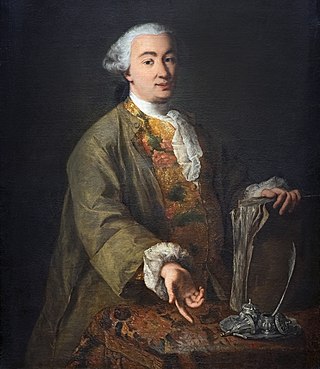
Carlo Osvaldo Goldoni was an Italian playwright and librettist from the Republic of Venice. His works include some of Italy's most famous and best-loved plays. Audiences have admired the plays of Goldoni for their ingenious mix of wit and honesty. His plays offered his contemporaries images of themselves, often dramatizing the lives, values, and conflicts of the emerging middle classes. Though he wrote in French and Italian, his plays make rich use of the Venetian language, regional vernacular, and colloquialisms. Goldoni also wrote under the pen name and title Polisseno Fegeio, Pastor Arcade, which he claimed in his memoirs the "Arcadians of Rome" bestowed on him.
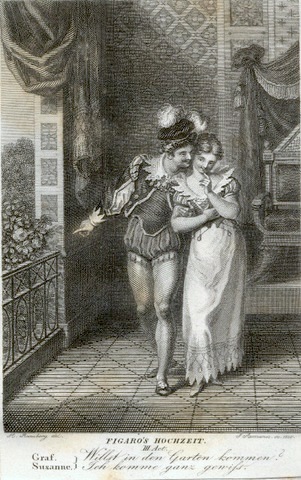
The Marriage of Figaro, K. 492, is a commedia per musica in four acts composed in 1786 by Wolfgang Amadeus Mozart, with an Italian libretto written by Lorenzo Da Ponte. It premiered at the Burgtheater in Vienna on 1 May 1786. The opera's libretto is based on the 1784 stage comedy by Pierre Beaumarchais, La folle journée, ou le Mariage de Figaro. It tells how the servants Figaro and Susanna succeed in getting married, foiling the efforts of their philandering employer Count Almaviva to seduce Susanna and teaching him a lesson in fidelity.

Baldassare Galuppi was a Venetian composer, born on the island of Burano in the Venetian Republic. He belonged to a generation of composers, including Johann Adolph Hasse, Giovanni Battista Sammartini, and C. P. E. Bach, whose works are emblematic of the prevailing galant music that developed in Europe throughout the 18th century. He achieved international success, spending periods of his career in Vienna, London and Saint Petersburg, but his main base remained Venice, where he held a succession of leading appointments.

Il matrimonio segreto is a dramma giocoso in two acts, music by Domenico Cimarosa, on a libretto by Giovanni Bertati, based on the 1766 play The Clandestine Marriage by George Colman the Elder and David Garrick. It was first performed on 7 February 1792 at the Imperial Hofburg Theatre in Vienna in the presence of Emperor Leopold II.

Italian opera is both the art of opera in Italy and opera in the Italian language. Opera was in Italy around the year 1600 and Italian opera has continued to play a dominant role in the history of the form until the present day. Many famous operas in Italian were written by foreign composers, including Handel, Gluck and Mozart. Works by native Italian composers of the 19th and early 20th centuries, such as Rossini, Bellini, Donizetti, Verdi and Puccini, are amongst the most famous operas ever written and today are performed in opera houses across the world.

L'Olimpiade is an opera libretto in three acts by Metastasio originally written for an operatic setting by Antonio Caldara of 1733. Metastasio’s plot vaguely draws upon the narrative of "The Trial of the Suitors" provided from Book 6 of The Histories of Herodotus, which had previously been the base for Apostolo Zeno's libretto Gli inganni felici (1695). The story, set in Ancient Greece at the time of the Olympic Games, is about amorous rivalry and characters' taking places to gain the loved one. The story ends with the announcement of two marriages.

Il viaggio a Reims, ossia L'albergo del giglio d'oro is an operatic dramma giocoso, originally performed in three acts, by Gioachino Rossini to an Italian libretto by Luigi Balocchi, based in part on the 1807 novel Corinne ou l'Italie by Germaine de Staël.
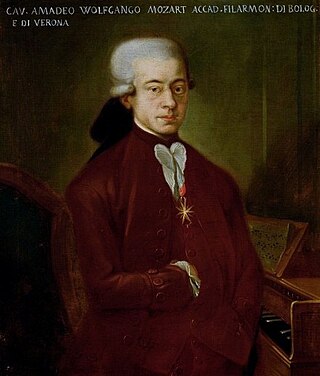
La finta giardiniera, K. 196, is an Italian-language opera by Wolfgang Amadeus Mozart. Mozart wrote it in Munich in January 1775 when he was 18 years old and it received its first performance on 13 January at the Salvator Theater in Munich. There is debate over the authorship of the libretto, written for Anfossi's opera the year before. It is often ascribed to Calzabigi, but some musicologists now attribute it to Giuseppe Petrosellini, though again it is questioned whether it is in the latter's style.

La finta semplice, K. 51 (46a) is an opera buffa in three acts for seven voices and orchestra, composed in 1768 by then 12-year-old Wolfgang Amadeus Mozart. Young Mozart and his father Leopold were spending the year in Vienna, where Leopold was trying to establish his son as an opera composer. He was acting on a suggested request from the Emperor Joseph II that the young boy should write an opera.
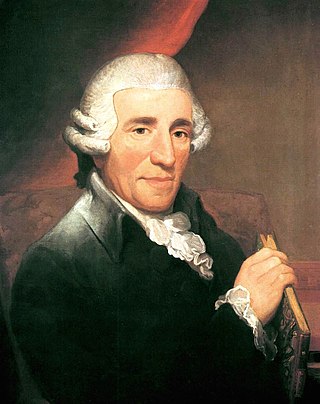
Il mondo della luna, Hob. XXVIII:7, is an opera buffa by Joseph Haydn with a libretto written by Carlo Goldoni in 1750, first performed at Eszterháza, Hungary, on 3 August 1777. Goldoni's libretto had previously been set by six other composers, first by the composer Baldassare Galuppi and performed in Venice in the carnival of 1750. It was then adapted for Haydn's version of the opera, which would be performed during the wedding celebrations of Count Nikolaus Esterházy, the younger son of Haydn's patron, Prince Nikolaus Esterházy, and the Countess Maria Anna Wissenwolf. It is sometimes performed as a singspiel under its German title Die Welt auf dem Monde.
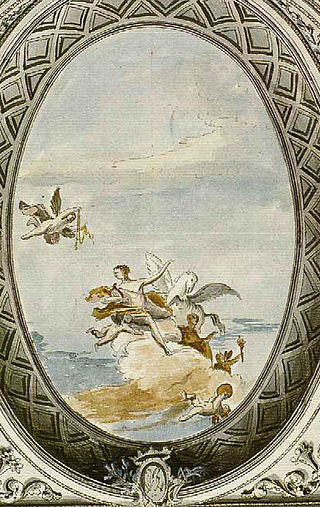
The Teatro San Moisè was a theatre and opera house in Venice, active from 1620 to 1818. It was in a prominent location near the Palazzo Giustinian and the church of San Moisè at the entrance to the Grand Canal.

Caterina Gabrielli, born Caterina Fatta, was an Italian coloratura singer. She was the most important soprano of her age. A woman of great personal charm and dynamism, Charles Burney referred to her as "the most intelligent and best-bred virtuosa" that he had ever encountered. The excellence of her vocal artistry is reflected in the fact that she was able to secure long-term engagements in three of the most prestigious operatic centers in her day outside of Italy.

Andrea Adolfati was an Italian composer who is particularly remembered for his output in the opera seria genre. His works are generally conventional and stylistically similar to the operas of his teacher Baldassare Galuppi. Although his music largely followed the fashion of his time, he did compose two tunes with unusual time signatures for his day: an air in 5
4 meter and another in 7
4 meter.
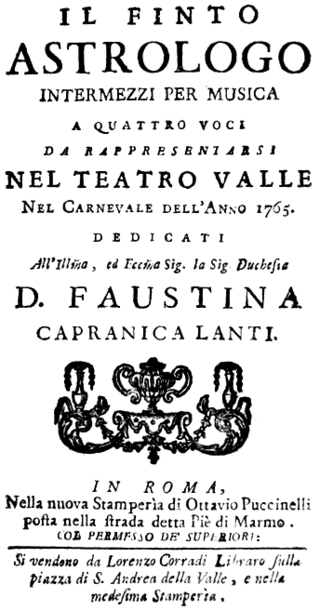
Il finto astrologo is an intermezzo by composer Niccolò Piccinni. The opera uses an Italian-language libretto by Carlo Goldoni. The work premiered at the Teatro Valle in Rome on 7 February 1765 with a cast that included the famous castrato Venanzio Rauzzini as Clarice.
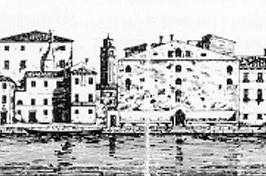
The Teatro San Angelo or Teatro Sant'Angelo was once a theatre in Venice which ran from 1677 until 1803.
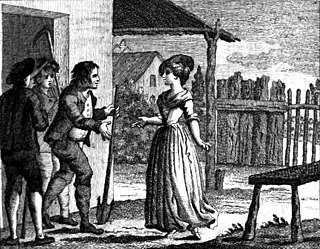
Il filosofo di campagna is a dramma giocoso per musica in 3 acts by composer Baldassare Galuppi. The opera uses an Italian language libretto by Carlo Goldoni. The work premiered at the Teatro San Samuele in Venice on 26 October 1754.
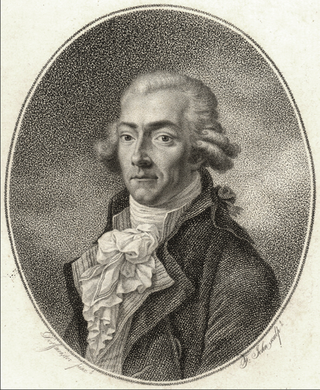
Francesco Benucci was an Italian bass/baritone singer of the 18th century. He sang a number of important roles in the operas of Wolfgang Amadeus Mozart, Antonio Salieri and other composers.
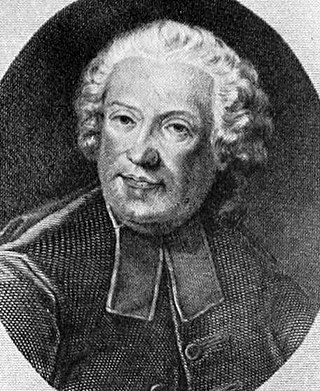
L'impresario delle Isole Canarie, also known as L'impresario delle Canarie or Dorina e Nibbio, is a satirical opera intermezzo libretto attributed to Metastasio, written in 1724 to be performed between the acts of Metastasio's opera seria Didone abbandonata. The first performance of the work was on February 1, 1724, in Naples, Italy, at Teatro San Bartolomeo. The first composer to set this libretto to music was Domenico Sarro, also known by the name Sarri, who also revised the work in 1730. The role of Dorina was first sung by the contralto Santa Marchesini, and Nibbio by the basso buffo singer Gioacchino Corrado. Later versions of this libretto appear with the titles L'impresario, L'impresario e la cantante and others.

Il mondo della luna is an opera in 3 acts by Baldassare Galuppi. The Italian-language libretto was by Carlo Goldoni. It premiered on 29 January 1750 at the Teatro San Moisè, Venice.

L'Olimpiade is an opera in the form of a dramma per musica in three acts by the Italian composer Giovanni Battista Pergolesi. Pergolesi took the text, with a few modifications, from the libretto of the same name by Pietro Metastasio. The opera first appeared during the Carnival season of 1735 at the Teatro Tordinona in Rome and "came to be probably the most admired" of the more than 50 musical settings of Metastasio’s drama.



















